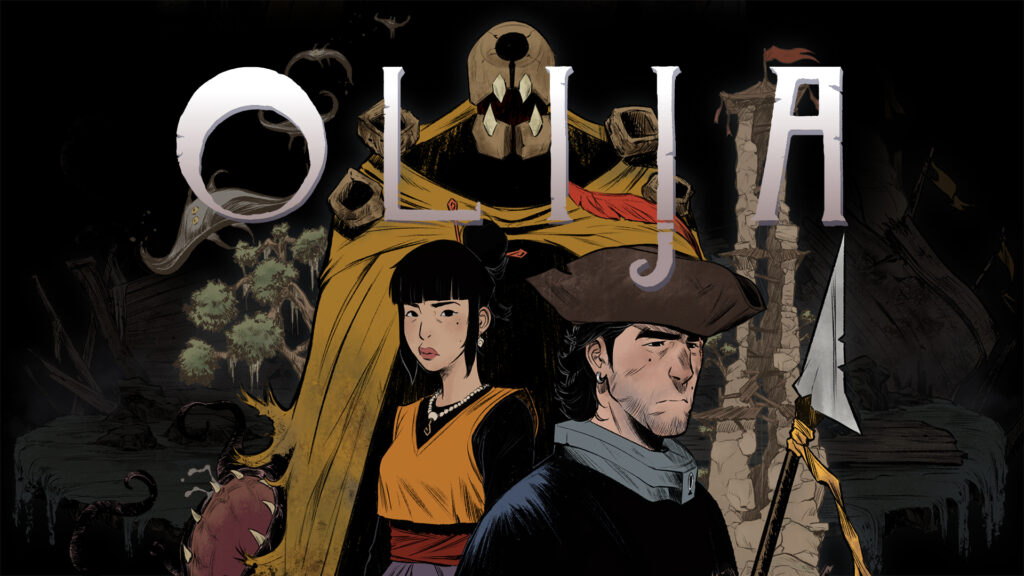
Disclaimer: The reviewer came across some graphical glitches which did not interfere with gameplay. We have been assured by the publisher this issue will be fixed in a Day 1 patch.
Whenever there is a new 2D indie action game, it’s a good chance that it’s going to be a “Metroidvania.” It seems that a majority of modern gamers just cannot fathom a 2D action game that has focus, and refuses to entertain anything that doesn’t permit any wandering.
Olija is something that aims to find a sweet middle ground between the open-endedness of the Metroidvania genre, and the carefully directed approach in a linear 2D action platformer. This is pulled off by crafting areas that invite the player to explore and solve puzzles, while trying to survive.
These areas are like mini-Metroidvania maps, and they are tied together by a map that feels like a throw-back to stage select screens from the NES era. Gamers are free to play some areas out of order to progress and each area brings with it a theme or gimmick.
Olija
Developer: Skeleton Crew Studio
Publisher: Digital Devolver
Platforms: Windows PC, Nintendo Switch, PlayStation 4, Xbox One (reviewed)
Release Date: January 28, 2021
Players: 1
Price: $14.99
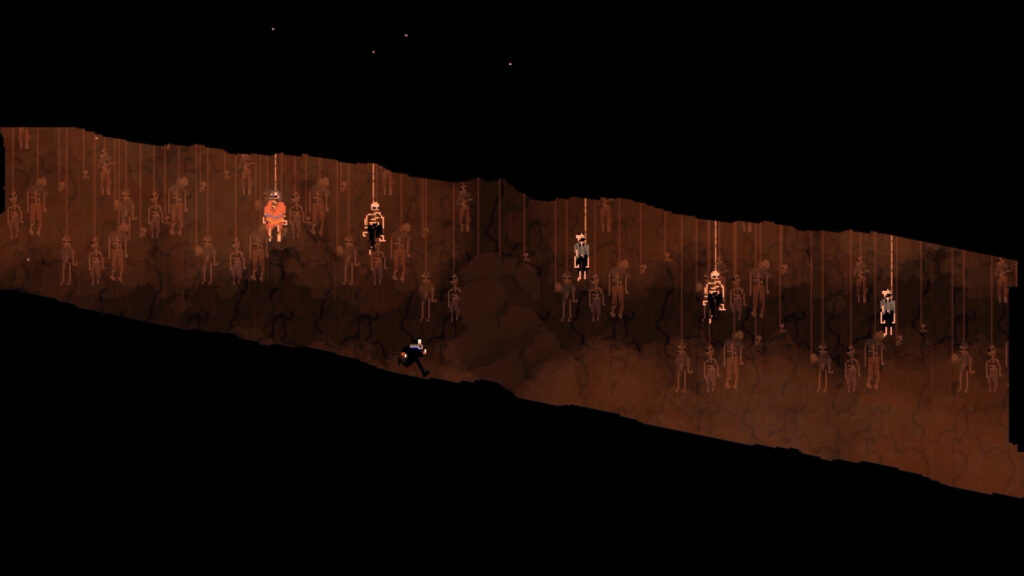
Olija is the kind of indie game that wears its influences on its sleeve, but does not lean on them. The minimalistic pixel art animated cutscenes take cues from the likes of Another World and Flashback, but only because those games came up with a graceful solution to tell their story in a visual way. Olija has the same aspirations for its story.
Lord Faraday and his crew get shipwrecked and marooned in an enigmatic oriental region called Terraphage. The islands that make up this area are teeming with ancient ruins and inhuman savages that have a penchant for splaying the bones of all trespassers. Unfortunately for the natives, Faraday is a brutal fighter.
Faraday is not entirely alone. He does befriend a few non-hostile denizens like the affable boatman, the cheeky hat maker, and of course; the beautiful Olija. There is even a relaxing and safe town area where Faraday can upgrade his health or commission an explorer to gather materials to craft new hats.
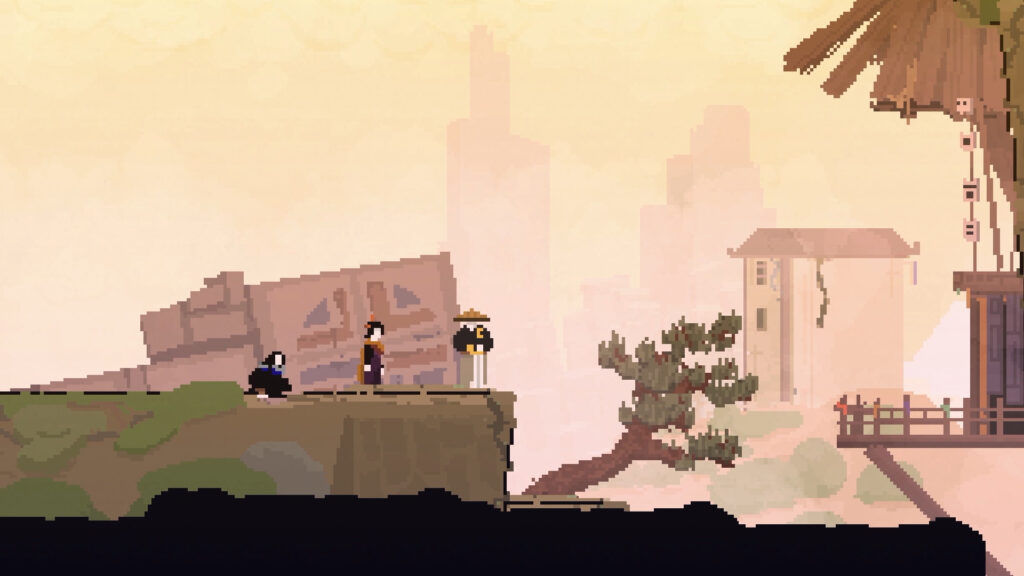
A majority of the adventure will have Faraday scouring the islands for his missing crew, and keys to open up the ominous black gate. Since he is a stranger in these lands, expect to throw-down with the local savages with some of the most elaborate combat mechanics seen in a 2D action platformer.
Lord Faraday has the moves of a black belt, swordsman, gunslinger, and a wrestling champion. He can do body slams, air-juggles, and even devastating haymakers. Building up a combo with successive hits accumulates power as represented by circles above Faraday’s head. When they converge, he can perform a super move that can launch smaller enemies across the screen.
The poor devils leave a violent and bloody streak as they fly, comically smacking into the hard granite. A sickening splatter sound is audible, signifying that the souls of these heathens have been claimed by the devil. It is satisfying, and would look horrifying if the in-game visuals were any less abstract.
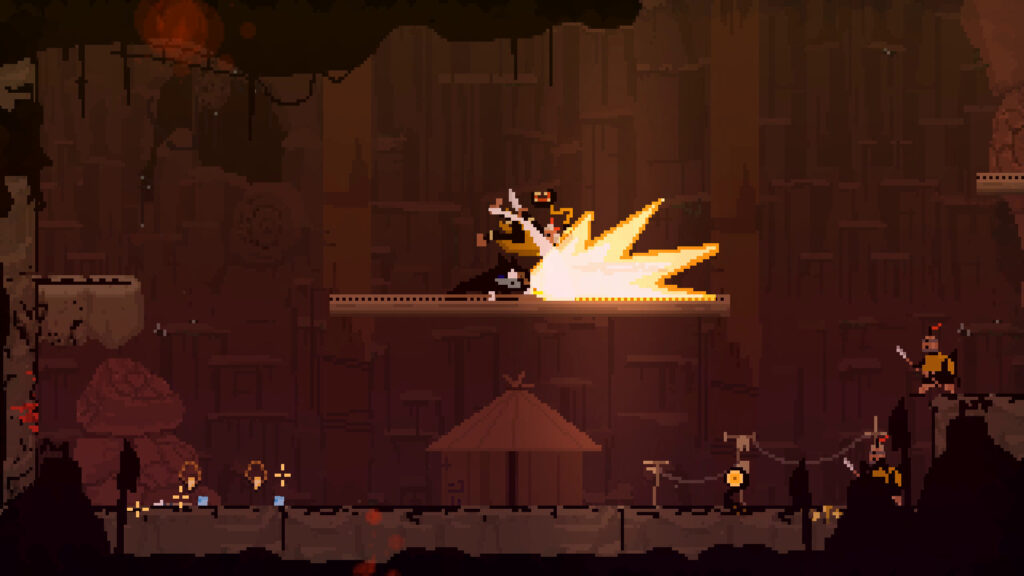
Faraday’s combat prowess is fully realized when he acquires a magical harpoon that can warp himself to whatever it stabs. This weapon allows players to zero in on any target in an instant when thrown. It makes for very fluid combat, and adds a surprising layer of depth when getting into tussles with bosses that have long health bars.
This weapon has multiple uses. It can be thrown, but is also effective for melee, and also comes comes with its own super moves which also gain an electrifying upgrade. The real shocker is how the harpoon is utilized in puzzles or to chain-warp across massive gaps. The level of inventiveness on display constantly keeps the player guessing and keeps Olija feeling fresh.
There are a diverse range of scenarios through out the islands. One area may be more focused on combat. Another region may have an emphasis on puzzle platforming. There are even places that feature a relaxing, story driven, adventure game style experience. There is almost no telling to what will come next.
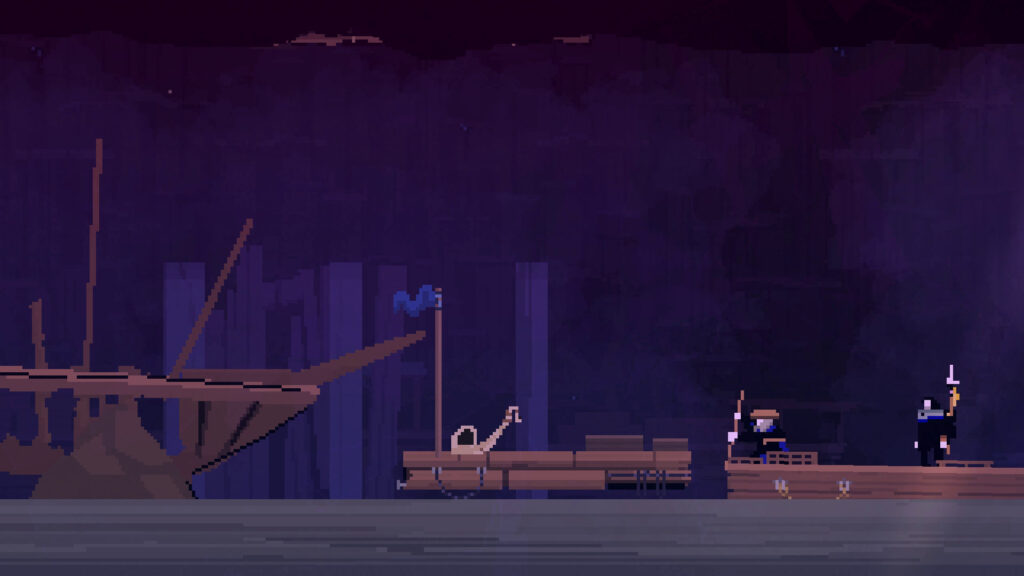
The various hats that can be crafted modify Faraday’s abilities in interesting ways. One style of rice-picker hat may have an effect that leaves acid puddles during combos. Another style expands the electrical properties when acquiring the thunder stone upgrade. Faraday can cause more damage with this, but comes with the trade-off of potentially electrocuting himself around water.
Choosing the right hat always comes down to a preference of play-styles. Olija is thoughtfully balanced to not have any single option be over or under powered. No matter what, Faraday is never pushed in one direction in how to fight.
The draw-back that Olija has with how effective Faraday is in battle, is how it makes the game too easy. Enemies and bosses don’t stand a chance against anyone who takes the time to understand the combo system. Faraday also is able to regain health all too easy from downed enemies, and has generous invincibility frames while dodging.
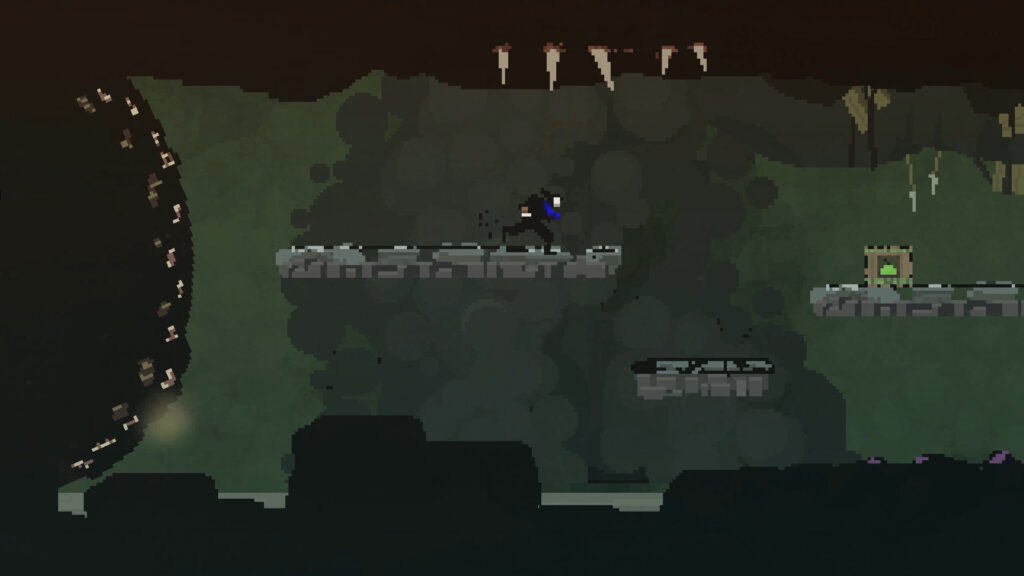
While the core mechanics, level layouts, and puzzle design is top-notch; the same cannot be said about the visuals. Olija opts to have a very lo-fi, minimalistic pixel art. The kind of visuals that make it look like a parody of modern indie games.
There is appeal to have with chunky pixel art, but Olija‘s choice of color and the absolute bare minimum of pixels makes the graphics just barely represent what they are supposed to be. The tribal aesthetic looks like primitive cave-art but with pixels in some areas, which does add a bit of uncanniness to the moments when the game veers into horror territory.
Most enemies are so vague in what they are supposed to be due to the artistic choice in pixel art. Even the player-character is made up of only a few dots, and sometimes looks more like a mime than a swashbuckling adventurer. This becomes tricky during some fights when it’s unclear to read what frames are tells from an enemy, since the visuals lack detail or clarity.
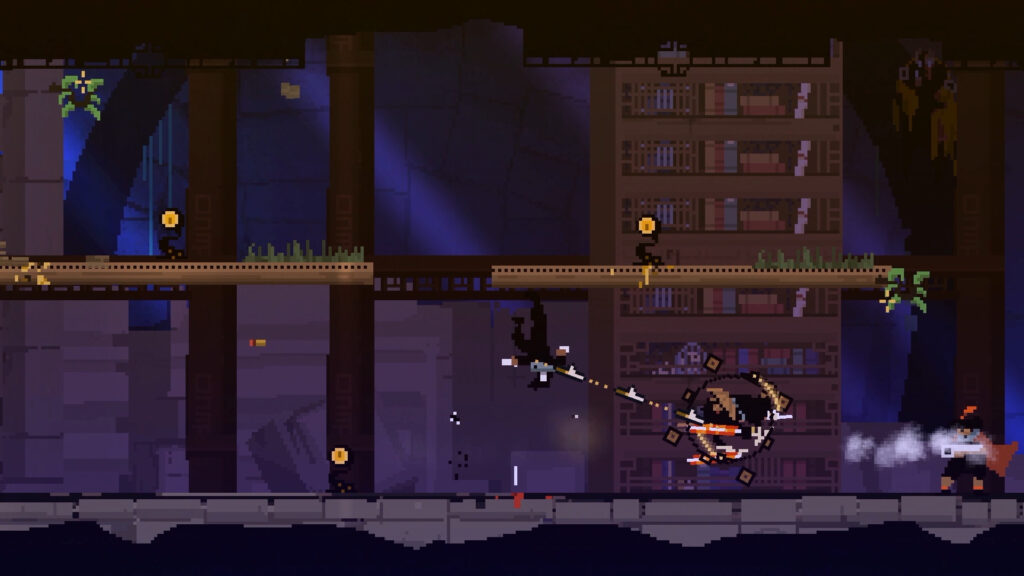
The art did not need Symphony of the Night levels of fidelity, but they could have used a bit more detail than none at all. Some enemies end up looking like comical children’s art due to the utter lack of effort in the craftsmanship, and it takes away from the atmosphere.
Olija may lack in artistry for its visuals, but it leans heavily on the incredible sound design that almost carries the ambiance. The sounds of meat pounding and ripping has a lot of varying samples through out. The overall feel of the world becomes a sweaty and dirty layer of filth and grime that peppers the soundscape.
The terrible scraping sounds of metal clashing and bones breaking makes Olija sound incredibly gory. Some audible cues border on nauseating due to how visceral and real they sound. Perhaps the lacking visuals prevent the violence from becoming too grotesque.
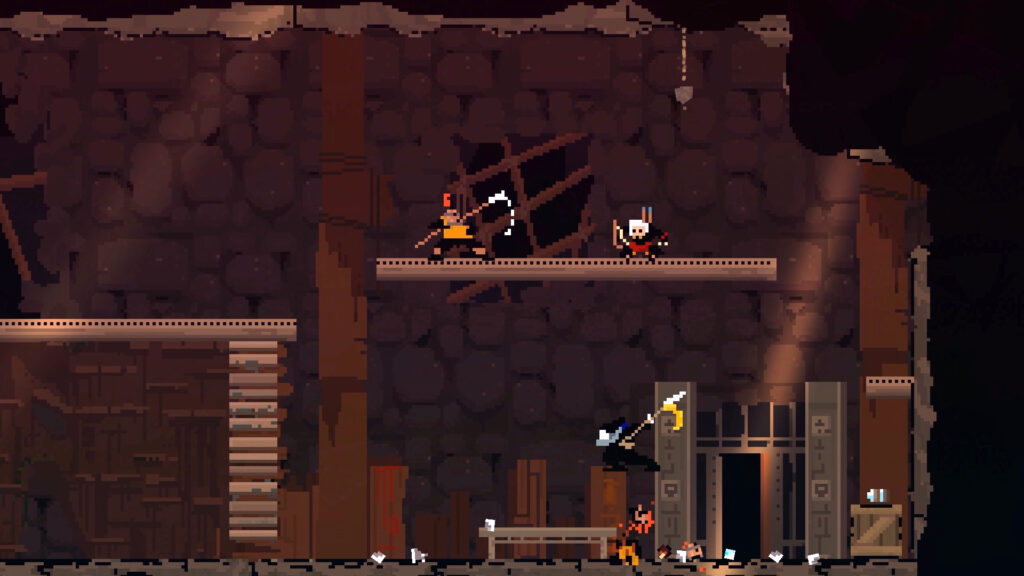
Having plenty of areas with unique gimmicks, Olija does not get old and is over before it can overstay its welcome. It is a very focused action game, free of the fluff and padding that tends to bloat many indie 2D action games these days. It offers just enough freedom to play certain areas at the player’s own pace.
Olija is a humble action platformer that excellently balances its narrative and gameplay. The combat is violent, and has a surprising amount of thought put into its mechanics. If only the visuals could match the effort put into the game design.
Anyone who can stomach the tired minimalistic 2D pixel art will find that Olija has quite a bit going for it. The low difficulty may turn off most hardcore players, and the violence may be too much for kids, but this would be a fine game for much older people who want to get into video games.
Olija was reviewed on Xbox Series S using a review code provided by Digital Devolver. You can find additional information about Niche Gamer’s review/ethics policy here.
Images: Steam